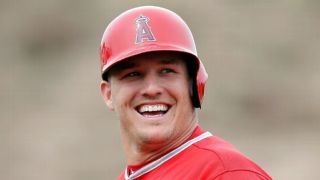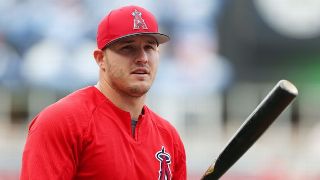|
ANAHEIM, Calif. -- Mike Trout threw to the wrong base in a game early in his career, and even now, he can recall just about every word Torii Hunter said to him about the play when they got back to the dugout: why he should have thrown homeward instead of to third base, why the runner at third started and then stopped and started again, and the pre-pitch visualization that must become second nature. Hunter's explanation was absorbed and embedded and is still utilized because this is how Trout attacks his own weaknesses. This is how he continues to get better. Trout is already generally regarded as baseball's best player, and he ranks among the very best players all time in adjusted OPS+: Only Babe Ruth, Ted Williams, Barry Bonds, Lou Gehrig and Rogers Hornsby rate better, as Trout is tied for sixth with his doppelganger, Mickey Mantle. But every year, there continue to be signs that he is improving as a player.  Take his swing-and-miss rate. In 2014, Trout compiled 184 strikeouts -- while on his way to winning the Most Valuable Player Award, by the way. Pitchers consistently tried to finish him off with fastballs high and inside, with some success, and his swing-and-miss rate that season was 7.6 percent. Take his swing-and-miss rate. In 2014, Trout compiled 184 strikeouts -- while on his way to winning the Most Valuable Player Award, by the way. Pitchers consistently tried to finish him off with fastballs high and inside, with some success, and his swing-and-miss rate that season was 7.6 percent.
Year to year, that percentage has steadily improved. He cut that number to 7.5 percent in 2015 to 7.1 in 2016 to 6.1 percent in 2017 to 5.4 percent so far this season. Trout, who will face CC Sabathia and the Yankees on Sunday Night Baseball, went into Saturday's game tied for the 10th-lowest strikeout rate in the major leagues. That means that Trout inhabits the same contact neighborhood as the likes of Joe Panik and Joe Mauer. "Plus," Sabathia said, "he's got the power." Trout's teammates say he will ponder a problem such as a crossword puzzle, with resolute confidence that he will identify a solution. What Trout decided, eventually, was to change his mental approach to high fastballs. For a time, Trout tried to anticipate high fastballs, look for them and attack them, but he felt that approach didn't work as well as he wanted (even though he continued to win MVP awards, as he appeared on every AL MVP ballot submitted in each of his first five years in the big leagues). Rather than anticipate those high fastballs, Trout decided to simply react to each pitch while understanding that pitchers would try to beat him up and in. He thought that small, mental tweak made a difference. He also choked up on the bat with two strikes, working to making contact and put the ball in play. As his swing-and-miss rate has continued to drop, so have his strikeouts -- by almost a third since the 2014 season. That hole above Trout's hands has largely closed, Sabathia noted. "I've seen him get to balls up there," Sabathia said Saturday. "I think he's like Miguel Cabrera, where you have to move the ball around on him. You can't pitch him the same way twice in a row." Trout's aim to improve is relentless on every side of the ball. At the outset of spring training this year, third-base coach Dino Ebel and the Angels' staff brought some metrics to him and some ideas on how he could be more efficient in his play in center field. Trout listened, took in all the information and was all-in -- just like he was when he was a young player and Hunter suggested some corrections. "He wants to win and get better," Ebel said. "This is what drives this guy."  Said right fielder Kole Calhoun, "If there is some part of his game where he can get better, he will work to get better." Said right fielder Kole Calhoun, "If there is some part of his game where he can get better, he will work to get better."
Mike Trout is 26 years old, and as Ebel said, he could theoretically be entering his prime -- with his best years, the best of Mike Trout, still ahead of him. News from around the major leaguesAs spring training began, the Yankees met with each of their major leaguers individually in get-togethers designed to be concise and empowering via a five-minute presentation. Manager Aaron Boone was in those discussions with coaches and a member of the team's analytics department. The goal was to give the players some information that would make them understand and feel good about something they do well and to give them something to think about that could help. The suggestion for Didi Gregorius was to consider how much difference a little more strike-zone discipline could make for him. The advice was not new or revolutionary. Typically, hitters have almost fully defined themselves by the time they are in their late 20s. You almost never see very aggressive hitters -- and Gregorius, who had never drawn more than 37 walks in a season before this one, has always been a very aggressive hitter -- change that particular trait. But Gregorius has evolved dramatically. Going into Saturday's game, he had drawn 17 walks already and was tied with Trout for the AL lead in homers with 10. His early-season on-base percentage of .368 was 79 points higher than what he posted last year. He has put himself in better counts with that additional discipline, forcing pitchers to throw him better pitches, and he has done enormous damage. • There is more and more talk in baseball about the problem of tanking, of teams designing failure. Going into play Saturday, there were eight teams on pace to lose 100 or more games, and incredibly, 16 teams are playing at a pace that would lead to 90 or more wins. According to the Elias Sports Bureau research, via Sarah Langs of ESPN Stats & Information, the most teams with 90-win seasons in one year is 11, which has happened twice, in 2002 and 2013. Last year, no team lost 100 games; in 2016, the Twins were the only team to drop 100 or more, with 103 losses. In Major League Baseball in 2018, there seem to be two significant races: one for the World Series and one for the top of the draft board. • The Diamondbacks' Patrick Corbin has emerged as one of the National League's best pitchers early this season through increased use of his slider. He throws that pitch 39 percent of the time -- only five pitchers work at a higher rate -- and so far this season, Corbin has a 1.89 ERA with a whopping 48 strikeouts in 33 ⅓ innings. The 28-year-old Corbin will be eligible for free agency at year's end and is already being linked to the Yankees, the team he rooted for as a kid in a family of Yankees fans. He recently told USA Today, "It would definitely be great to play there." • The Nationals have been playing without Daniel Murphy, Adam Eaton or Anthony Rendon for most of the first weeks of the season, and the impact on Bryce Harper has been tangible, with opposing pitchers simply refusing to throw him strikes. Only 36.2 percent of the pitches thrown to Harper this year have been in the strike zone, the lowest percentage for any hitter in the majors. Harper has 34 walks and only 20 hits. At this rate, he'll draw more than 200 walks, a level only Barry Bonds has attained. • Justin Verlander is renowned for his in-game focus, for being mentally locked into his work, and this was borne out in a moment the other day. When Jose Altuve hit his first homer of the season, teammates jokingly decided to give him the silent treatment in the dugout. Only Verlander, oblivious to all but the business of shutting down the Angels, greeted Altuve with a high five. • Ronald Acuna Jr.'s power was on display in his first hours in the big leagues this week when the superstar prospect clubbed a second-deck home run in Cincinnati. But one rival scout thought his most striking skill -- that which will make the greatest immediate difference -- in his first games was his A-plus speed, which Acuna used to race around the bases and with his defensive work in the outfield. Baseball Tonight PodcastFriday: Astros Manager A.J. Hinch on Verlander and why he hasn't brought up the hangover questions; Indians president Chris Antonetti on the team's weird April, Trevor Bauer and Jose Ramirez; Jessica Mendoza on Shohei Ohtani's hitting mechanics; Karl Ravech on Acuna Jr. Thursday: Keith Law on the debut of Acuna Jr.; actor Hank Azaria on the development of his Jim Brockmire character and a critique of Tim Kurkjian's acting chops; Sarah Langs plays The Numbers Game. Wednesday: David O'Brien of the Atlanta Journal Constitution about the promotion of Acuna; Jerry Crasnick on the Angels-Astros rivalry and Derek Jeter’s interview with Bryant Gumbel; Paul Hembekides on why we're not appreciating Mookie Betts enough. Tuesday: A chat with Nationals manager Dave Martinez; Bob Nightengale of USA Today on a jarring strikeout statistic and the question of whether the Giants should market Madison Bumgarner; Sarah Langs and The Numbers Game. Monday: Tim Kurkjian on Sean Manaea's no-hitter and an impossible poll question; a conversation with Alex Wood about his unusual delivery; Todd Radom’s weekly quiz and uniform history lesson. And today will be better than yesterday.
|
